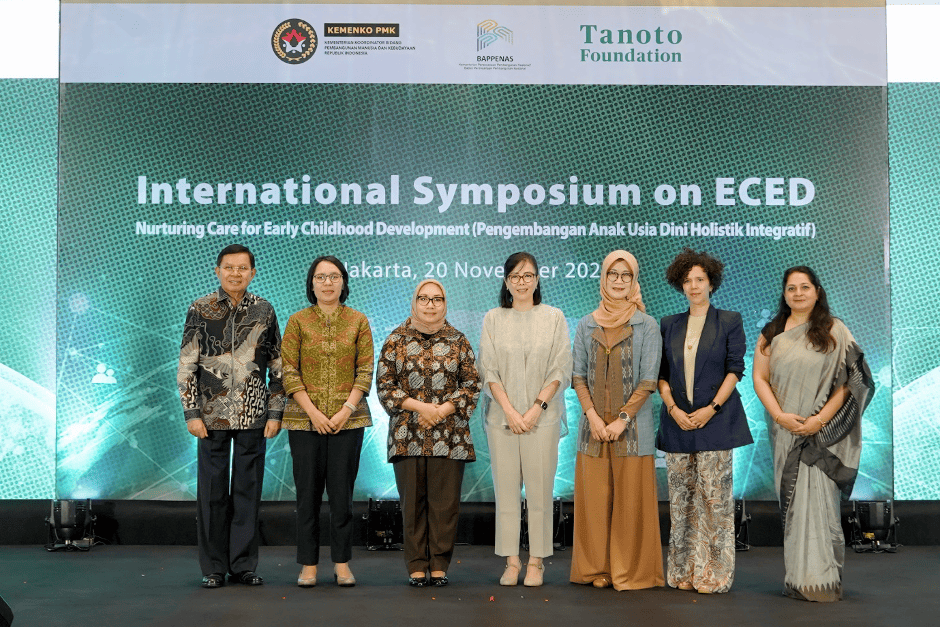Tanoto Foundation, KemenkoPMK, KemenPPN, and KemenPPPA Enhance Early Childhood Development and Education in Indonesia Through an International Symposium

Jakarta, November 20, 2024 – Attention to early childhood development and education in Indonesia remains far from the ideal. Early childhood is a critical foundation for children’s future success and human capital development, which can break the cycle of poverty and boost economic productivity.
Quality development and education are fundamental rights of every child. These rights must be fulfilled from an early age to ensure children grow and develop optimally, without exception. Their fulfillment also has a profound impact on fostering inclusive and sustainable societal development.
In Indonesia, early childhood development and education face numerous challenges. Awareness of the interconnected needs of young children remains low. Many still perceive early childhood development merely as a health and nutrition issue. In fact, young children require responsive caregiving, adequate stimulation, and protection. Additionally, the coordination among service providers across multiple sectors has yet to be optimized, with services often segmented by sectoral interests rather than being holistic and integrated.
These challenges underscore the collaboration among the Coordinating Ministry for Human Development and Cultural Affairs (Kemenko PMK), the Ministry of National Development
Planning/Bappenas, and Tanoto Foundation in organizing the **International Symposium on Early Childhood Education and Development 2024** in Jakarta on November 20, 2024.
With the theme “Nurturing Care for Early Childhood Development (Holistic and Integrated Early Childhood Development)”, the symposium aims to gather experts and stakeholders to share knowledge, the latest research findings, and best practices. It also seeks to align thoughts and program planning for early childhood development and education based on the Nurturing Care Framework (NCF), known in Indonesia as Holistic and Integrated Early Childhood Development (PAUD HI).
The NCF also serves as a tool to assist countries in achieving Sustainable Development Goals (SDGs), particularly those related to early childhood, such as improving nutrition, reducing infant mortality rates, providing universal access to quality preschool education, and preventing violence and neglect of children.
“This international symposium is expected to guide government policies in drafting the second phase of the National Action Plan (RAN) for Holistic and Integrated Early Childhood Development (PAUD HI) for the 2025-2029 period. This plan will serve as a framework for providing services at both the national and regional levels, ensuring better quality and alignment with international standards,” said Arifah Fauzi, Minister of Women’s Empowerment and Child Protection, during the opening of the International Symposium on Early Childhood Education and Development 2024.
Arifah explained that her ministry currently implements several flagship programs, such as the Ruang Bersama Merah Putih, a platform for fulfilling the rights and protection of women and children at the village level; the SAPA 129 call center for violence against women and children; and the **One Gender and Child Data** initiative. These programs also target early childhood.
“We extend our appreciation to Tanoto Foundation for initiating this symposium. We hope this event becomes a pivotal moment to strengthen synergies between the government, society, and international organizations in supporting holistic and integrated early childhood development,” Arifah added.
Woro Srihastuti, Deputy for the Coordination of Quality Improvement of Children, Women, and Youth at the Coordinating Ministry for Human Development and Cultural Affairs, emphasized the potential for inter-agency synergy through the Ruang Bersama Merah Putih platform.
“Mechanisms for its implementation in 2025-2029 will be prepared. One key aspect is redefining the measurement instruments for PAUD HI. Currently, there is only the Early Childhood Development Index (ECDI). We need additional derivations of ECDI to enable each institution to measure the various components of PAUD HI,” Woro elaborated.
During the same event, Inge Kusuma, Country Head of Tanoto Foundation Indonesia, highlighted the significance of the first 1,000 days of a child’s life as the period of the fastest brain development, which cannot be replicated later in life.
“Eighty percent of brain development occurs in the first three years, with peak sensory, auditory, language, and cognitive development happening in the first year. If we fail to intervene during this golden period, the impact on a child’s future will be significant and may hinder their development in later stages of life,” Inge noted.
“NCF and PAUD HI have provided clear guidelines to ensure optimal growth and development for young children. The challenge lies in our commitment and implementation in Indonesia. We hope
this symposium strengthens the commitment of all stakeholders, serves as a platform for knowledge exchange, and enhances the implementation of PAUD HI,” Inge concluded.
The symposium, involving government officials, academics, international organizations, non-governmental organizations, professional associations, practitioners, and media representatives, is expected to build a foundation for raising awareness among stakeholders about early childhood development. Together, they aim to make early childhood development a national development agenda priority.
Speakers at the event included representatives from Kemenko PMK, KemenPPN/Bappenas, KemenKes, the National Nutrition Agency, UNICEF EAPRO, UNICEF Indonesia, WHO, The World Bank, ARNEC, SEAMEO CECCEP, Ishk Tolaram, Tulodo, UPTD PPA Depok, and Tanoto Foundation.
***
About Tanoto Foundation
Tanoto Foundation is an independent philanthropic organization in the field of education, founded by Sukanto Tanoto and Tinah Bingei Tanoto in 1981, based on the belief that everyone should have the opportunity to realize their full potential. Tanoto Foundation’s programs are founded on the conviction that quality education accelerates equal opportunities. We strive to unlock potential and improve lives through quality education, from early childhood to productive ages. Tanoto Foundation’s three pillars of commitment are enhancing learning environments, developing future leaders, and facilitating medical research.
For more information, please contact:
Tanoto Foundation Communications Team
Email: communications@tanotofoundation.org
Website: www.tanotofoundation.org

Leave a Reply